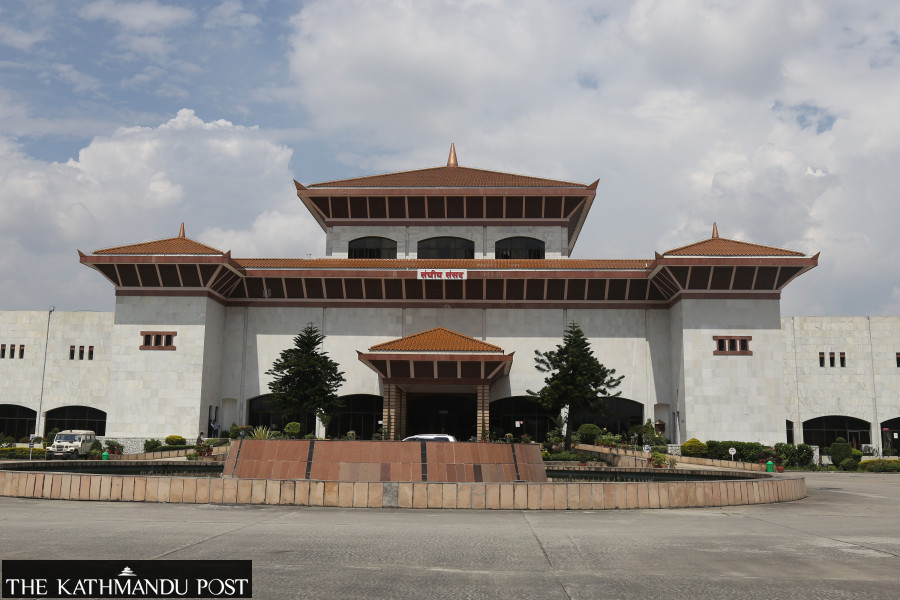Columns
A new approach to legislation in Nepal
To enhance transparency in law-making, citizen’s true involvement and ownership should be ensured.
Khim Lal Devkota
The Nepali Congress opposes the government's use of an ordinance to amend laws for the investment summit, bypassing parliamentary scrutiny. Despite Congress's criticism, the President has approved the ordinance. Congress argues that such actions undermine constitutional, parliamentary, and democratic principles, asserting that only Parliament should legislate. Congress emphasises that ordinances should address urgent legislative gaps during parliamentary recess, not substitute regular lawmaking processes. Congress firmly condemns the government's actions, advocating for adherence to constitutional and parliamentary procedures.
Devaluing Parliament
Former Prime Minister KP Sharma Oli faced backlash for issuing ordinances like appointing Constitutional Commission officials and dividing political parties. For this, he was criticised not only by citizens but also by the current Prime Minister, Pushpa Kamal Dahal. Congress president Sher Bahadur Deuba also introduced a divisive party ordinance during his tenure. Such actions have become routine for leaders in power, sparking public discontent.
The government's reliance on ordinances during parliamentary recesses is concerning. In the recent winter session, only one bill was passed in the House of Representatives (HoR) and two in the National Assembly (NA), totalling just three bills from the federal Parliament. This indicates a devaluation of Parliament's role in drafting legislation.
It is inappropriate to issue ordinances when Parliament is not in session and to delay bill proceedings during parliamentary sessions. It is the government's responsibility to ensure the effective functioning of Parliament and provide sufficient legislative business. However, introducing bills through ordinances during parliamentary recesses not only undermines Parliament but also reflects the absence of transparency and public participation in the bill-making process.
In this context, to enhance transparency in law-making and ensure citizen involvement, a bill related to ‘Legislation’ has been introduced in Parliament as a special initiative of the NA. Originating from the NA, this bill has been approved and forwarded to the HoR. It has undergone theoretical discussions in the HoR and is anticipated to proceed to the parliamentary committee for further deliberation.
Secondary laws
The core task of Parliament is to draft laws. It delegates the power of formulating secondary laws (rules, regulations, guidelines, procedures, manuals, orders, and standards, among others) to the executive. However, it has been found that most of the secondary laws issued by the executive exceed the authority granted by the primary laws (the Act). Reports of the Commission for the Investigation of Abuse of Authority (CIAA) and the Office of the Auditor General have highlighted secondary laws as weapons of corruption. Ministries and agencies issue these laws, but most aren’t made public. The exact number of these laws is uncertain in Nepal. According to NA publications, up to 20 percent of laws issued in Nepal are primary laws, while the rest are secondary laws. The CIAA and other agencies concluded that the ratio of corruption is also similar.
It is argued that citizen participation in law formulation, exercised through Parliament, reflects sovereign rights. However, true citizen ownership remains limited. Draft bills undergo parliamentary scrutiny and committee review, with input from subject experts. Yet, there is heavy influence from interest groups, especially on government bills directed by political parties. Discussions often feel superficial, diverging from federalism principles and subnational rights. This hints at the opaque nature of delegated laws issued by ministries, likely undermining citizen interests and governance standards. To enhance transparency and citizen engagement, the government has introduced the "legislation" bill to Parliament, backed by the efforts of the NA's Delegated Legislation Committee. This move aims to involve subnational governments, fostering a more inclusive and accountable lawmaking process.
Legislation bill
The primary responsibility of Parliament is to formulate laws, but in Nepal, it is a chaotic process. Inspiration can be taken from the experiences of other countries regarding bill drafting. The Swiss constitution’s provision that mandates the government to discuss with cantons (provinces) and other stakeholders before advancing any significant bill is noteworthy. Citizens can even challenge the bills passed by Parliament through direct democracy tools. The Swiss parliament and government consistently prioritise decisions with citizens in mind. If citizens are dissatisfied with any aspect of the constitution, they have the right to call a referendum.
Given Switzerland's emphasis on citizen involvement in drafting bills, it seemed logical to pursue similar measures in Nepal. After a year of discussions with the government, Radheshyam Adhikari, Ram Narayan Bidari and I initiated this bill. The matter was discussed with the Law, Justice, and Parliamentary Affairs ministers several times.
While discussing this bill, the Sectoral Ministry should identify the bill to be prepared every year and send it to the Ministry of Law before the end of Jestha (May/June). The Ministry should send it to the federal Parliament before the end of Asar (June/July). Problems arise due to a lack of coordination between sectoral ministries and the law ministry regarding bill drafting. Parliament isn’t aware of the number of bills being drafted. This arrangement is expected to solve this problem. After receiving approval from the government, the relevant ministry should publish it on the website for 30 days for citizens' opinions and suggestions. In the bill drafting process, the relevant ministry should participate in discussions with subject experts and stakeholders. This is an important arrangement made for citizens' suggestions in the draft of the bill itself.
The practice of overnight submission and undisclosed approval by the Council of Ministers persists, as in the case of the ‘Civil Service Bill’. Approved by the cabinet on September 7, 2023, it was registered in Parliament on March 21, 2024—after six months. Similarly, the education bill was forwarded to Parliament without stakeholder consultation. Initially, private schools fell under Ghuthi (trust) jurisdiction by the cabinet decision, but it was later reversed. Moreover, reinstating district education offices, previously abolished, in the bill drew criticism from subnational government levels.
During discussions on the legislation bill, it's proposed that subnational governments be involved in drafting concerning concurrent rights among federal units. The relevant ministry is tasked to engage in thematic committee discussions as per the Intergovernmental Coordination law, with participation from all seven province ministers and local representatives. This bill establishes benchmarks and limits for delegated legislation. It mandates prompt registration with the Ministry of Law and publication on the ministry's website within seven days of receipt. Legal recognition of delegated legislation is contingent upon its publication in the ‘Nepal Gazette’ or other official means, addressing concerns of clandestine issuance. This comprehensive approach ensures transparency and inclusivity in the legislative process, particularly regarding the involvement of subnational governments in drafting and the transparent publication of delegated legislation.
This bill benefits citizens and supports subnational levels by ensuring transparency and minimising interference from interest groups in the drafting process. It also ends the practice of introducing bills without stakeholder consultation. Currently, it awaits committee discussion in the HoR alongside the Civil Service Bill Approval is anticipated in the upcoming budget session, likely to convene within a week or two.




 11.12°C Kathmandu
11.12°C Kathmandu















